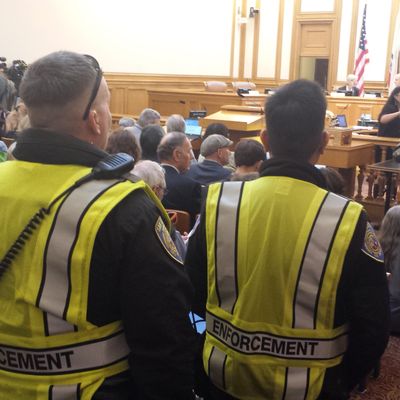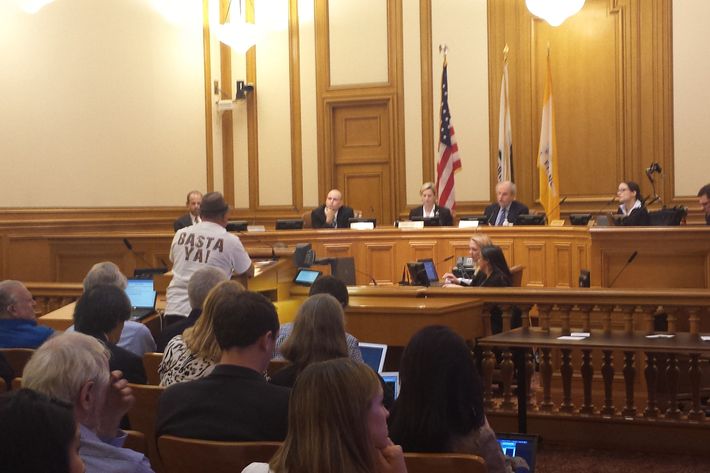
A phalanx of activists, tech employees, and media onlookers converged on San Francisco City Hall yesterday for what must have been one of the more lively transportation board meetings in American history. On the agenda: the eternally contentious issue of Silicon Valley commuter shuttles.
One activist, surveying the larger-than-expected turnout at a pre-hearing rally on the City Hall steps, said to a friend, “We’re gonna need a bigger megaphone!”
The proposal in question was a fait accompli at the outset. With little deliberation after about two hours’ worth of public comments, the SFMTA board of directors voted unanimously to approve a pilot program that requires Silicon Valley companies to get permits for buses that pick up passengers in San Francisco, and pay $1 per stop per day for the use of about 200 municipal bus stops throughout the city. That fee will amount to about $100,000 a year for the likes of Facebook and Google — a drop in the bucket for them, and just enough to cover the costs of running the pilot for the city.
Part of what makes the debate about Google buses — as all tech shuttles are collectively known here, no matter whose they are — so fierce is that there seems to be a fundamental disagreement about what’s at stake. Tech employees see the Wi-Fi-equipped shuttles as nothing more than a boring corporate perk — “a thing on wheels that gets us to work,” as one Googler put it at the hearing. As my year-ago ride on a Facebook shuttle confirmed, these aren’t party buses in the least; most tech workers sleep or answer e-mails on a silent hourlong commute to the peninsula. And it’s hard to argue with Google buses on the merits. They reduce emissions, cut down drastically on the number of individual cars being driven in San Francisco, and make the city a more livable place for people who would otherwise be stuck in San Jose. They do produce some first-order consequences that aren’t great (clogged bus stops, frequent delays for public-transport riders) but nothing that couldn’t be ironed out with better data and planning.
Of course, the Google bus wars have never really been about the Google buses.
For concerned locals, the shuttles symbolize their collective fears about the rise of the tech sector — that rents are spiking, that long-time residents are being pushed out by coddled 22-year-olds with Stanford BAs and venture funding, that a great American city with a rich countercultural history is turning into a staid bedroom community for Silicon Valley. It’s hard for people to put these feelings into words, and even harder to get them heard in front of cameras and policymakers. And so, when the MTA board announced a hearing on the bus issue with time set aside for public comments, it was a good bet that the tech resisters would turn it into a catchall venting session.

“This is class warfare! This is not an accident! This is privatization of public spaces!” said one opponent of the bus proposal.
“These buses represent filthy rich corporations that could pay more,” said another.
“We need to squeeze them for everything they’re worth,” said a third.
Sadly, what could have been a constructive dialogue was instead an afternoon largely spent listening to two groups talking past each other. One by one, tech employees approached the microphone to talk about how great the shuttles were – how they made living in San Francisco and working in Silicon Valley possible, how they contributed to the growth of local businesses, how they helped save the environment. Then, the activists would get their turn, and they’d talk about opportunity and fairness — how it wasn’t right to have people suffering and kicked out of their homes in the midst of such massive, dynastic wealth creation, and how the tech community had shirked a neighborly duty to the rest of San Francisco. The nerds were using the language of utility; the activists were giving sermons.
In the end, it didn’t really matter what the activists said. They weren’t going to change the outcome, in part because this was a hearing that, because it fell under the SFMTA’s purview, could only deal with certain narrow topics. And the best argument they have against the buses — that giant tech companies should be paying more for the privilege of commandeering public bus stops — was impossible in practice. Under state law, the SFMTA can’t charge more for the use of bus stops than it needs to recoup its costs, meaning that even if San Francisco’s officials wanted to bleed Sergey Brin dry, they wouldn’t be allowed.
The best solution to the Google bus problem was something close to the one the SFMTA adopted. But the larger issues remain untouched. For the vehicles to lose their symbolic villain status and become part of the normal fabric of urban life, the tech industry will need to stop seeming like a threat to working-class existence. That isn’t likely to happen, given that the drivers of the current housing crisis in San Francisco — astronomically high demand coupled with low supply, poor zoning, and a labyrinthine development process — are so hard to change. And I wouldn’t hold my breath hoping for a make-nice community outreach project from Google or Facebook as long as their buses are being stopped in the streets. Instead, with each passing protest, tech workers will circle the wagons, and the locals will become angrier.
The pilot program approved yesterday won’t fix the social problems created by intense, localized wealth generation. But neither will any other SFMTA program. What’s needed, instead, is a massive citywide reconciliation effort – perhaps starting with a series of town hall meetings – that can serve as a venue for tech workers to hear, in moral terms, why their proliferation is worrying residents of San Francisco, and for anxious locals to better understand, in utilitarian terms, that the city’s development rules and the basic laws of supply and demand are doing far more to cause displacement than the Google buses. Then, with calmer ground established, the two groups could begin to sort through some of the policy specifics.
Barring another 2000-style crash, the tech industry isn’t going away. For the Google bus wars to end, the nerds and the locals are going to have to start speaking each other’s languages, before someone gets hurt.





























